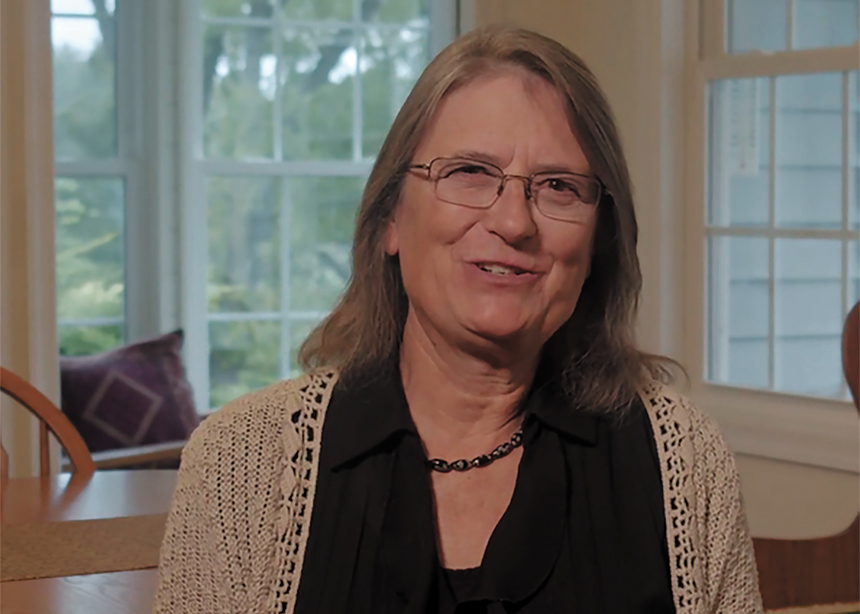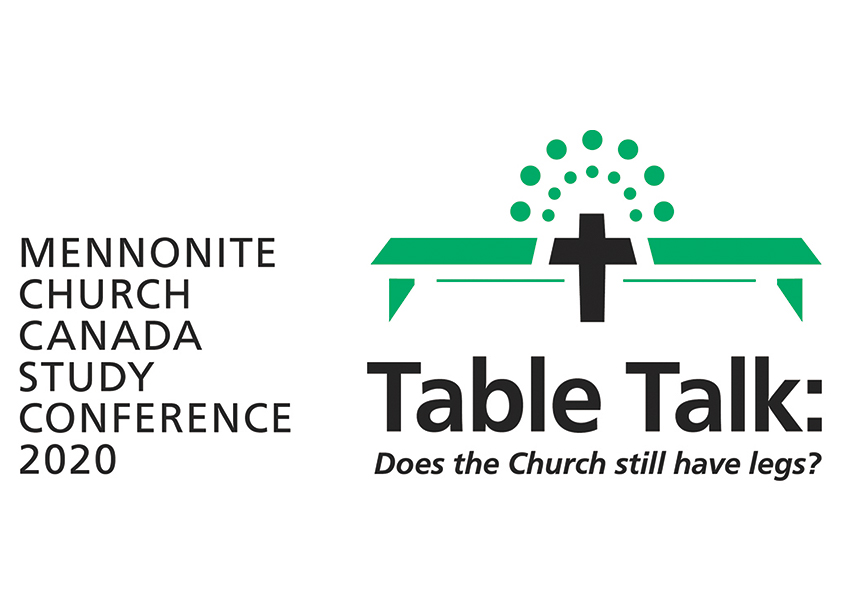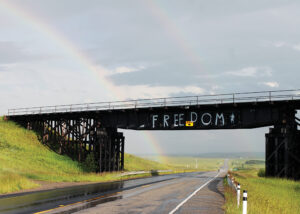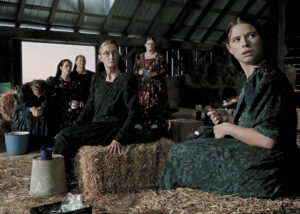A feast of metaphors was on the menu for Mennonite Church Canada’s inaugural study conference on the character and mission of the church and the role of worship. “Table talk: Does the church still have legs?” was originally planned as an in-person gathering, but the Oct. 25 event was moved online because of pandemic gathering restrictions.
Sara Wenger Shenk, president emeritus of Associated Mennonite Biblical Seminary, Elkhart, Ind., and plenary speaker for “Table talk,” served up a main course of extended metaphors for some 200 participants to chew on. Other academics brought more images and stories to the table. To whet appetites, organizers provided participants with access to two of the main addresses several days before the start of the online event.
Kim Penner, adjunct professor at Conrad Grebel University College, hosted the four-and-a-half-hour video conference that included more presentations, original music from singer-songwriter Bryan Moyer Suderman, opportunities to ask questions, and time for conversations in small groups.
Using I Peter 2:9-10, Wenger Shenk explored three metaphors in answer to the question, “Why church?”
North Star
Like migrants, Mennonites are disoriented by competing voices, culture wars and alternative universes (fake news). Fatigued, hopeful, at risk and vulnerable, the church is needed to “keep us oriented Godward,” she said, adding that, as “custodians of God’s story,” the church needs to keep listening for how to interpret that story for today.
A body
The church is about relationships. People are hungry for hope, love, sanctuary, rest and friendship. In the church, every part serves, cares for and connects to the whole, especially in hard times. This takes practice in prayer, listening, discernment, confession, worship, forgiveness and truth telling. “Practising how to be like Jesus is why we need the church,” she said.
A river
The church can be a “river of healing” flowing from the centre of its worship, “contributing to the flourishing” of communities by focusing on neighbourhood ministry, as well as global awareness, care for the earth and racial justice, she said, adding that, by trying to “preserve the purity of the church” through an emphasis on boundaries, certainty and dogmatism, creates an “us versus them” posture that is dismissive of others, and cultivates a sense of “moral superiority. . . . We will not flourish as an exclusive, tribal church.”
Throughout the conference, speakers drew on Scripture and experience to wrestle with how the identity of the church is lived out in practice.
Bryan Born, president of Columbia Bible College, Abbotsford, B.C., added more food for thought with his presentation on what it means for the church to be missional. He cautioned against emphasizing worship at the expense of mission. He called on the church to join God, who “is already at work,” suggesting that the way of Jesus is to serve those who are most in need.
He said the tension between evangelism and social action is a “fruitless divide.” Instead, he called for holistic biblical discipleship that cares for physical, spiritual, personal and social needs.
He said the church has “tremendous opportunity” to minister in at least two areas of its “highly polarized” and “isolated” context. In response to Black, Indigenous and people of colour (BIPOC) calls for justice, and those struggling with mental illness, the church can sensitively navigate by listening well and communicating how to live in hope.
Sheila Klassen-Wiebe, associate professor at Canadian Mennonite University (CMU), led a Bible study on the parable of the great banquet in Luke 14, exploring how Jesus engaged in “table talk.” Noting that “eating is never just about food” in the Bible, Klassen-Wiebe suggested that in this parable Jesus unsettles the assumptions of those with privilege and power by emphasizing the “radical hospitality and generosity” of the host who invites even those who are “not enough” to the table.
Gerald Gerbrandt, president emeritus of CMU, highlighted the Jewish festival practices described in the Old Testament as helpful biblical resources for understanding worship. As important times in community life, festivals celebrated what God had done, welcomed strangers as friends, and encouraged generosity to those in need.
Jesse Nickel, a Columbia professor, explored worship in the New Testament through the lens of the Christ hymn in Philippians 2:5-11. In retelling the story of who God is, the hymn equips the church by presenting a “strikingly distinct world-view” on which to build community, he said.
Irma Fast Dueck, associate professor at CMU, used stories from her experience to remind listeners that worship is a spiritual practice that “asks something of us.” She cautioned that Christians “domesticate worship and God” if they make worship in their image, to meet their needs.
Jeremy Bergen, associate professor at Grebel, suggested that worship can transform worshippers despite their cynicism, criticism, fear and uncertainty. In spite of themselves, they can be surprised when Jesus shows up.
Bergen’s use of the metaphor of a “push-me/pull-you,” that fictional two-headed creature of Dr. Doolittle stories, served to highlight some creative tensions around the character and mission of the church:
- Testimony with conviction versus deep listening.
- Decentralized versus centralized organization and leadership.
- Loyalty to God versus working with governments.
- Boundedness versus universality.
- Service versus self care.
- Continuity versus change.
The elephant at the table was COVID-19 and its oversized impact on the church. Speakers and participants acknowledged the fear, uncertainty, limits and disruption of the pandemic, and how much it has unsettled people’s sense of normal. In response, many suggested a focus on neighbourhood ministry, small groups and being real with each other. They also drew on the deep promise that God is with them. Wenger Shenk, using the metaphor of the church as a “womb of joy,” suggested that joy is “an act of resistance against despair.”
Doug Klassen, executive minister of MC Canada, opened and closed the conference with prayer and reflection, and offered thanks for the rich feast.
Presentation recordings are available through CommonWord.ca.
Do you have a story idea about Mennonites in Eastern Canada? Send it to Janet Bauman at ec@canadianmennonite.org.
Related story:
Does the Church have varicose veins?











Leave a Reply
You must be logged in to post a comment.